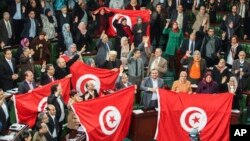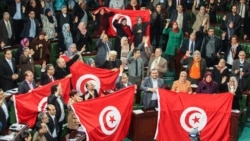The United States is very encouraged by Tunisia's ratification of a new constitution and the installation of an independent government. On a recent visit to Tunisia, U.S. Deputy Secretary of State William Burns called this a historic and hopeful moment in the country's democratic transition.
Three years ago, the Tunisian people launched a revolution the effects of which have been felt around the region, a revolution aimed at freedom, dignity, and opportunity. The path has not been easy. There have been many setbacks and challenges. But today, thanks to their determination and courage, Tunisians stand closer to realizing the promise of their revolution.
Tunisia's new constitution enshrines universal human rights for all Tunisians. It continues Tunisia's long tradition of respect for the rights of women and minorities, and it will allow the Tunisian people to realize the aspirations they expressed in their revolution: democracy, rule of law, personal security, and economic opportunity.
The installation of a new, independent government under the leadership of Tunisian Prime Minister Mehdi Jomaa is an important step to ensure that the country has a competent and non-partisan leadership during the period leading to the next election.
The United State welcomes the establishment of the Independent Elections Commission and encourages the new government to move quickly to set a date for early elections so that the Tunisian people can choose their new leaders and determine the country's future. "Just as men and women made their voices heard on the streets of Tunis," said U.S. Secretary of State John Kerry, "their voices must also be heard in the halls of government."
During his visit, Deputy Secretary Burns announced that, pending congressional approval, the United States would provide $10 million to expand the Thomas Jefferson Scholarship program for Tunisian students to spend one year studying at a college or university in the United States.
Tunisia remains a source of inspiration for people across the region. It stands as an example of what dialogue and compromise can achieve. And it serves as a reminder that despite all the challenges and all the uncertainties of change, a better future is still very much within reach.
Three years ago, the Tunisian people launched a revolution the effects of which have been felt around the region, a revolution aimed at freedom, dignity, and opportunity. The path has not been easy. There have been many setbacks and challenges. But today, thanks to their determination and courage, Tunisians stand closer to realizing the promise of their revolution.
Tunisia's new constitution enshrines universal human rights for all Tunisians. It continues Tunisia's long tradition of respect for the rights of women and minorities, and it will allow the Tunisian people to realize the aspirations they expressed in their revolution: democracy, rule of law, personal security, and economic opportunity.
Just as men and women made their voices heard on the streets of Tunis, their voices must also be heard in the halls of government."U.S. Secretary of State John Kerry
The United State welcomes the establishment of the Independent Elections Commission and encourages the new government to move quickly to set a date for early elections so that the Tunisian people can choose their new leaders and determine the country's future. "Just as men and women made their voices heard on the streets of Tunis," said U.S. Secretary of State John Kerry, "their voices must also be heard in the halls of government."
During his visit, Deputy Secretary Burns announced that, pending congressional approval, the United States would provide $10 million to expand the Thomas Jefferson Scholarship program for Tunisian students to spend one year studying at a college or university in the United States.
Tunisia remains a source of inspiration for people across the region. It stands as an example of what dialogue and compromise can achieve. And it serves as a reminder that despite all the challenges and all the uncertainties of change, a better future is still very much within reach.

















